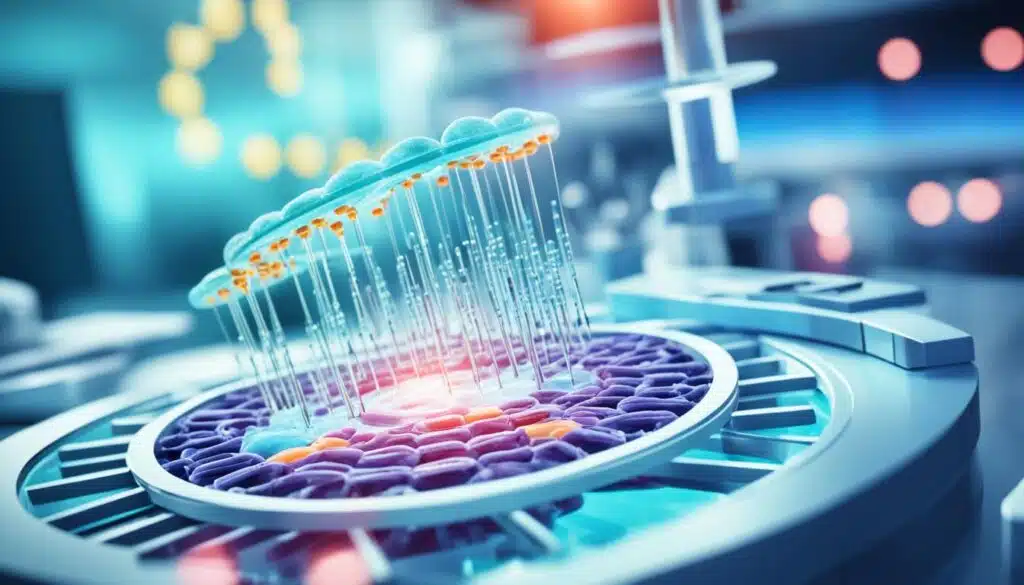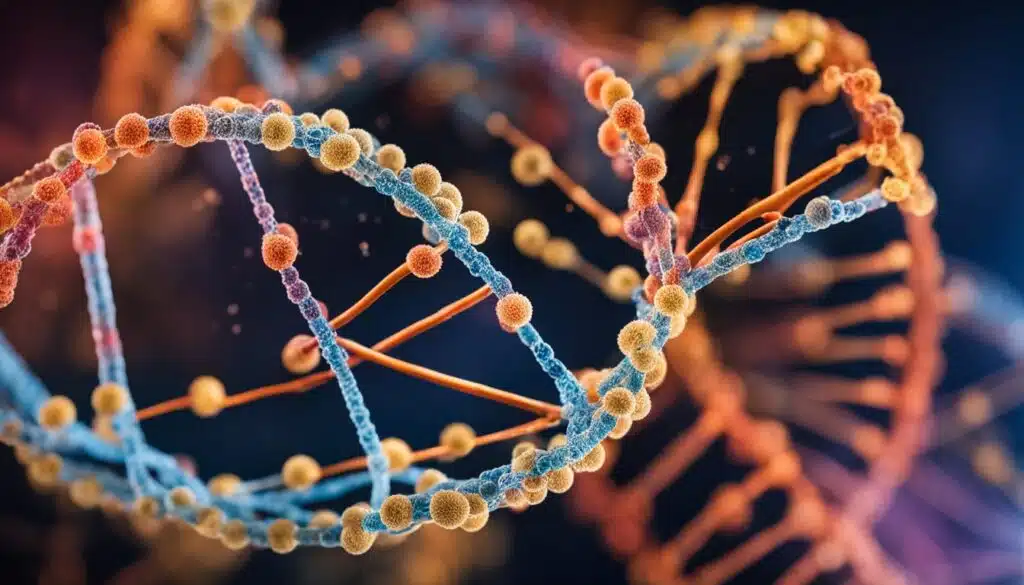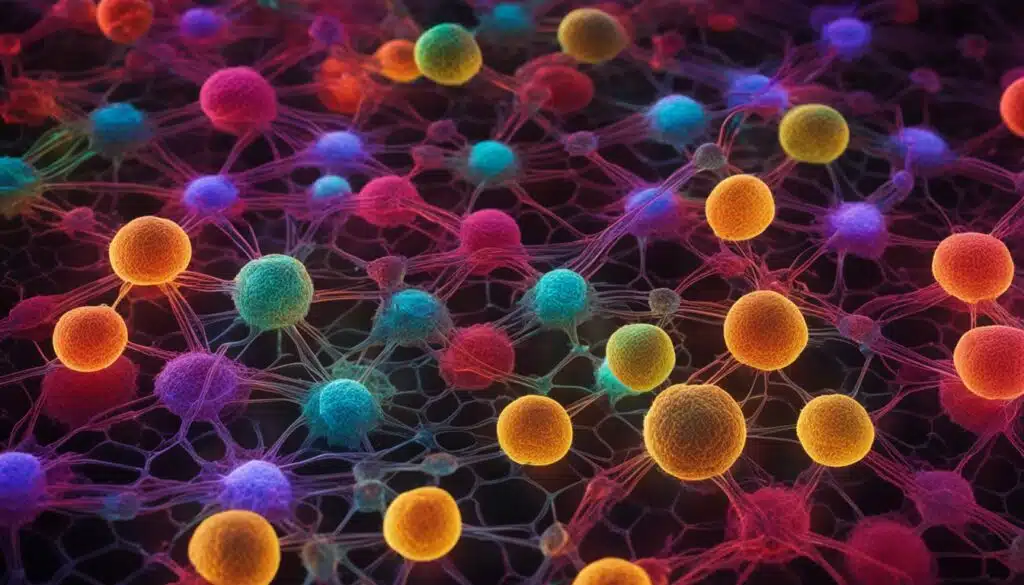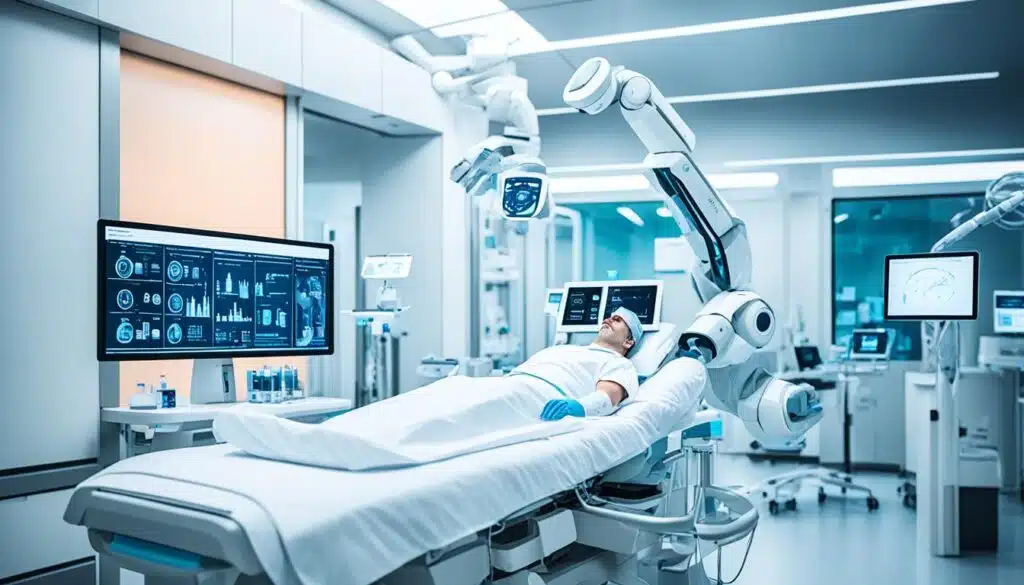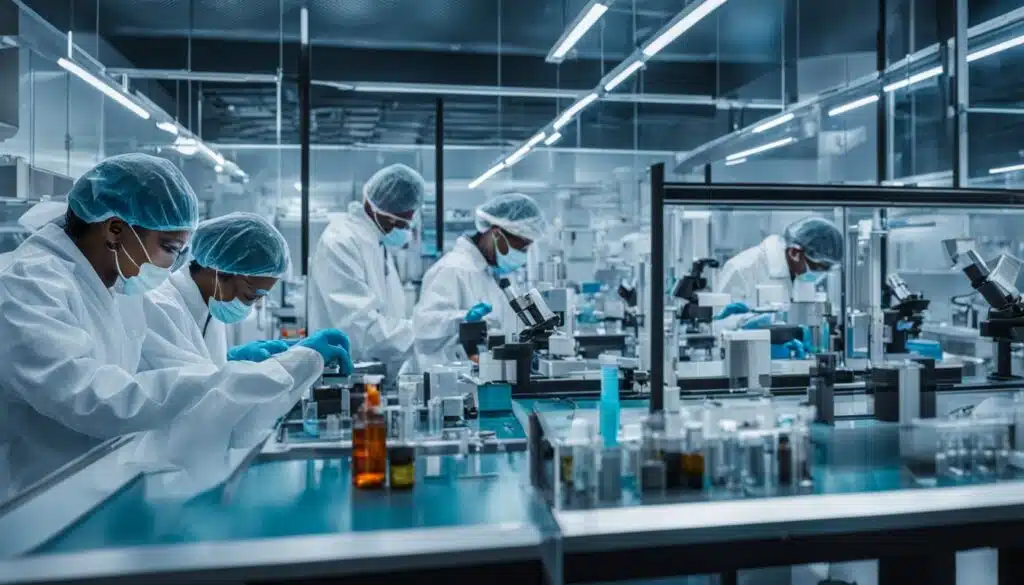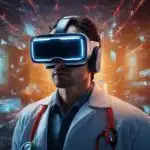The field of medicine is undergoing a profound transformation, thanks to the remarkable advancements in scientific research and the integration of cutting-edge technologies. Medical professionals and researchers are pushing the boundaries of what’s possible, harnessing the power of science for medical breakthroughs that are dramatically improving patient care and outcomes.
From the development of precision medicine and gene therapy to the integration of artificial intelligence (AI) and machine learning, the medical landscape is evolving at an unprecedented pace. Biomedical engineering, computational biology, proteomics, and bioinformatics are just a few of the disciplines that are driving this transformation, unlocking new frontiers in healthcare technology and medical imaging.
As the COVID-19 pandemic has underscored, the ability to rapidly develop effective vaccines and therapeutics is crucial in combating infectious diseases and safeguarding public health. Stem cell research and regenerative medicine also hold immense promise, offering the potential to restore function and enhance the quality of life for individuals suffering from a wide range of medical conditions.
This article will explore the remarkable ways in which science is transforming the field of medicine, delving into the cutting-edge advancements that are propelling us towards a future where personalized, precision-based healthcare is the norm. By harnessing the power of science for medical breakthroughs, we can truly revolutionize the way we approach patient care and unlock new frontiers in the pursuit of better health outcomes.
Key Takeaways
- Science is driving remarkable advancements in the field of medicine, pushing the boundaries of what’s possible in healthcare.
- Cutting-edge technologies, such as artificial intelligence and machine learning, are being integrated into medical research and patient care, dramatically improving outcomes.
- Precision medicine and gene therapy are transforming the way we approach treatment, tailoring therapies to the unique characteristics of each individual patient.
- Stem cell research and regenerative medicine offer the potential to restore function and enhance the quality of life for those suffering from a wide range of medical conditions.
- The COVID-19 pandemic has highlighted the critical importance of rapid vaccine and therapeutic development, driven by scientific innovation.
Unleashing the Power of Scientific Innovation
The medical research landscape is undergoing a profound transformation, as scientists and healthcare professionals harness cutting-edge technologies to push the boundaries of what’s possible in the field of medicine. From the integration of artificial intelligence and machine learning to the advancements in computational biology, proteomics, and medical imaging, the medical research ecosystem is embracing a new era of innovation.
Pushing the Boundaries of Medical Research
Researchers in the fields of biomedical engineering and healthcare technology are leveraging cutting-edge tools to drive groundbreaking discoveries. By harnessing the power of big data and advanced analytics, they are able to analyze vast datasets, identify novel drug targets, and develop personalized treatment approaches that cater to the unique needs of each patient.
Harnessing Cutting-Edge Technologies
The integration of artificial intelligence and machine learning technologies is revolutionizing the healthcare industry, from accelerating drug discovery and development to improving diagnostics and medical imaging. These advanced computational tools are empowering clinicians and healthcare professionals to make more informed decisions, enhance patient care, and ultimately improve patient outcomes.
Collaborating for Groundbreaking Discoveries
The most impactful medical breakthroughs often arise from the intersection of diverse disciplines, where scientists, clinicians, and healthcare professionals come together to leverage their collective expertise. This interdisciplinary collaboration is crucial in bridging the gap between basic scientific research and its clinical application, propelling the field of biomedical innovation forward.
| Advancements in Medical Research | Impact on Healthcare |
|---|---|
| Integration of Artificial Intelligence and Machine Learning | Accelerate drug discovery and development, enhance diagnostics and medical imaging, improve clinical decision-making |
| Advancements in Computational Biology and Proteomics | Identify novel drug targets, develop personalized treatment approaches, analyze large patient datasets |
| Collaboration Across Disciplines | Bridge the gap between basic research and clinical applications, drive groundbreaking discoveries, enhance patient care and outcomes |
The Transformative Potential of Gene Therapy
Gene therapy has emerged as a groundbreaking field within medical research, offering the promise to revolutionize treatment approaches for a wide range of genetic disorders. By directly targeting the underlying genetic causes of diseases, gene therapy holds the potential to address the root of the problem, rather than merely managing the symptoms.
Revolutionizing Treatment Approaches
The advent of gene therapy has introduced a paradigm shift in the way clinicians and medical professionals approach the treatment of genetic disorders. By leveraging advancements in precision medicine and personalized medicine, gene therapy enables healthcare providers to tailor treatments to the unique genetic makeup of each individual patient, enhancing the efficacy and improving patient care.
Overcoming Genetic Disorders
From rare inherited conditions to complex, multifactorial diseases, gene therapy holds the potential to address a vast array of genetic disorders. By targeting the root causes of these ailments, gene-based treatments offer the promise of not only managing the symptoms but potentially curing or reversing the underlying genetic abnormalities. This breakthrough approach holds the power to transform the lives of countless individuals and their families, ushering in a new era of healthcare advancement.
Science for Medical Breakthroughs
The intersection of science and medicine is a dynamic and rapidly evolving field, giving rise to groundbreaking medical breakthroughs. At the forefront of this transformation is the advent of precision medicine, which leverages advanced technologies and patient-specific data to tailor treatments and therapies to the unique characteristics of each individual.
Precision Medicine: Tailoring Treatments
By harnessing the power of genomics, molecular profiling, and artificial intelligence, clinicians can now develop personalized treatment plans that address the underlying genetic and biological factors driving a patient’s condition. This approach to personalized medicine enables healthcare providers to optimize therapeutic interventions, enhance patient outcomes, and minimize the risk of adverse reactions.
Leveraging Patient Data for Insights
The vast troves of patient data generated through electronic health records, clinical trials, and advanced diagnostic tools are becoming invaluable resources for medical researchers and clinicians. By analyzing these comprehensive datasets using machine learning algorithms, healthcare professionals can uncover valuable insights that inform the development of more effective treatments and improve patient care.
Enhancing Clinical Decision-Making
The integration of cutting-edge technologies, such as artificial intelligence and machine learning, is revolutionizing the way clinicians approach diagnosis and treatment planning. By leveraging real-time data and advanced biomarker analysis, healthcare providers can make more informed decisions, optimize clinical trials, and ultimately enhance the overall quality of patient care.
Advancing Stem Cell Research and Regenerative Medicine
Stem cell research and regenerative medicine have emerged as pivotal areas of scientific inquiry, offering the potential to transform the way we approach healthcare and patient care. By harnessing the remarkable regenerative capabilities of stem cells, researchers are developing innovative therapies that can restore function and improve the quality of life for individuals suffering from a wide range of medical conditions.
Unlocking the Healing Power of Stem Cells
The field of stem cell research has made significant strides in recent years, unlocking the incredible potential of these versatile cells to regenerate and repair damaged tissues and organs. Through advanced techniques and a deeper understanding of stem cell biology, scientists are pioneering novel regenerative medicine approaches that harness the innate healing power of stem cells to treat a variety of diseases and injuries.
Restoring Function and Quality of Life
The advancements in stem cell research and regenerative medicine have profound implications for patient care, offering the promise of restoring function and enhancing the quality of life for individuals facing a wide range of medical challenges. From spinal cord injuries and neurodegenerative disorders to heart disease and autoimmune conditions, these innovative therapies are paving the way for groundbreaking breakthroughs that can dramatically improve patient outcomes.
| Stem Cell Research Breakthroughs | Potential Clinical Applications |
|---|---|
| Induced Pluripotent Stem Cells (iPSCs) | Personalized disease modeling, drug screening, and cell-based therapies |
| Embryonic Stem Cell (ESC) Advancements | Tissue engineering, regenerative medicine, and the treatment of degenerative diseases |
| Mesenchymal Stem Cell (MSC) Therapies | Orthopedic injuries, autoimmune disorders, and cardiovascular diseases |
| Neural Stem Cell (NSC) Applications | Neurological disorders, spinal cord injuries, and neurodegenerative conditions |
The Role of AI and Machine Learning in Healthcare
The integration of artificial intelligence (AI) and machine learning (ML) technologies is revolutionizing the healthcare landscape, enabling breakthroughs across numerous domains. In the realm of drug discovery and development, these advanced computational tools are dramatically accelerating the process by analyzing vast datasets, identifying novel drug targets, and predicting the efficacy and safety of potential therapeutic candidates.
Accelerating Drug Discovery and Development
The application of AI and ML in the biomedical and computational biology fields has significantly accelerated the traditionally lengthy and complex drug discovery and development pipeline. These advanced technologies enable researchers to analyze large volumes of data, including chemical compounds, genetic information, and patient records, to identify promising drug candidates more efficiently. Furthermore, AI-powered algorithms can simulate the interactions between potential drugs and biological targets, helping to predict their efficacy and safety profiles, ultimately improving patient care and outcomes.
Improving Diagnostics and Medical Imaging
The integration of AI and ML is also revolutionizing the field of diagnostics and medical imaging. These technologies are enabling the rapid and accurate analysis of vast amounts of medical data, including patient scans, test results, and electronic health records. By leveraging real-time algorithms, healthcare professionals can improve the accuracy and speed of disease detection, diagnosis, and treatment planning, ultimately enhancing patient care and outcomes.
Combating Infectious Diseases and Pandemics
The COVID-19 pandemic has underscored the critical importance of scientific research in combating infectious diseases and preparing for future public health crises. In the face of this global challenge, researchers and medical professionals have risen to the occasion, leveraging their expertise and collaborative efforts to develop effective vaccines and therapeutic interventions.
Developing Effective Vaccines and Therapeutics
The development of safe and efficacious vaccines has been a top priority in the fight against the COVID-19 pandemic. Scientists have worked tirelessly to understand the novel SARS-CoV-2 virus, its viral mutations, and the most effective ways to stimulate the immune system to combat the infection. The rapid development and deployment of COVID-19 vaccines have been a testament to the power of scientific innovation and global collaboration.
Alongside vaccines, researchers have also focused on developing therapeutic options to treat those infected with the virus. From investigating monoclonal antibodies to exploring repurposed drugs and novel antiviral compounds, the medical community has been working tirelessly to expand the therapeutic ecosystem and provide effective patient care.
Understanding Viral Mutations and Variants
As the COVID-19 pandemic has evolved, the scientific community has closely monitored the emergence of viral mutations and variants. Understanding the genetic changes and their potential impact on vaccine efficacy and therapeutic effectiveness is crucial for staying ahead of the curve and ensuring continued public health preparedness.
Researchers have leveraged advanced genomic sequencing and computational biology techniques to track the emergence and spread of viral variants. This knowledge has informed the development of updated vaccines and therapeutics that are better equipped to target the evolving pathology of the virus.
Enhancing Public Health Preparedness
The COVID-19 pandemic has underscored the urgent need to enhance public health preparedness and strengthen the global healthcare ecosystem. Lessons learned from this crisis have highlighted the importance of investing in infectious disease research, building robust surveillance systems, and fostering international collaboration and data-sharing.
By harnessing the power of science and technology, the medical community is working to advance healthcare and ensure that we are better equipped to respond to future pandemics. From improving diagnostic capabilities to enhancing patient care and therapeutic options, the scientific breakthroughs emerging from this challenging time hold the promise of a more resilient and prepared global public health system.
Personalized Medicine: Tailoring Treatments for Optimal Outcomes
The rise of personalized medicine is a testament to the power of scientific innovation in transforming healthcare. By harnessing the insights gleaned from genomics and molecular profiling, clinicians can now tailor treatments to the unique genetic and molecular characteristics of each individual patient.
Harnessing Genomics and Molecular Profiling
Advancements in personalized medicine and precision medicine have enabled healthcare providers to leverage the patient’s genetic information and molecular-level data to develop targeted, individualized treatments. This approach allows clinicians to make more informed decisions, leading to improved patient care and outcomes.
Addressing Individual Variations and Complexities
Every individual presents unique variations and complexities in their medical condition. By leveraging artificial intelligence and machine learning algorithms to analyze large datasets and biomarkers, clinicians can now better understand these nuances and design treatments that are tailored to the specific needs of each patient. This real-time, data-driven approach helps to enhance the overall patient care and improve patient outcomes.
Interdisciplinary Collaboration: Bridging Science and Medicine
The most impactful medical breakthroughs often arise from the intersection of diverse disciplines, where scientists, clinicians, and healthcare professionals come together to leverage their collective expertise and drive innovation. This interdisciplinary collaboration is crucial in bridging the gap between basic scientific research and its clinical applications.
Fostering Collaborative Ecosystems
By fostering collaborative ecosystems that bring together researchers and clinicians from various backgrounds, including the biomedical field and school of medicine, the medical community can harness the power of science to propel groundbreaking advancements in healthcare and patient care.
Translating Basic Research into Clinical Applications
The ability to effectively translate basic research into tangible clinical applications is crucial for ensuring that the insights and discoveries generated in the laboratory can be leveraged to enhance patient care and deliver meaningful breakthroughs. By fostering this seamless collaboration between the scientific and medical communities, we can accelerate the advancement of innovative treatments and therapies.
Ethical Considerations in Medical Breakthroughs
As the healthcare industry continues to witness remarkable advancements driven by scientific innovation, it is crucial to carefully examine the ethical implications of these medical breakthroughs. Ensuring the safety and privacy of patients is of paramount importance, as clinicians and researchers navigate the complexities of emerging technologies and novel therapies.
Also Read : Diving Into Radiology: Understanding The Medical Discipline
Ensuring Patient Safety and Privacy
The rapid development and implementation of cutting-edge medical technologies, such as gene therapy, regenerative medicine, and artificial intelligence-powered diagnostics, raise pressing concerns about patient safety and privacy. Clinicians and policymakers must work diligently to establish robust guidelines and regulations that prioritize the well-being and autonomy of patients throughout the research and clinical application processes.
Maintaining the highest standards of patient privacy is also essential, as the integration of advanced data analytics and personalized medicine necessitates the collection and handling of sensitive medical and genetic information. Strict data protection protocols, informed consent procedures, and transparent communication with patients are crucial to building and preserving trust within the healthcare ecosystem.
Addressing Societal Implications
The transformative potential of medical breakthroughs extends beyond individual patient outcomes, as these advancements can have far-reaching societal implications. Careful consideration must be given to the equitable access and distribution of emerging therapies, ensuring that underserved and marginalized communities are not left behind in the quest for improved quality of life.
Furthermore, the ethical and societal implications of technological advancements, such as the use of artificial intelligence in healthcare, must be thoroughly examined. Potential biases, privacy concerns, and the impact on the healthcare workforce must be thoroughly addressed to ensure that these innovations enhance, rather than disrupt, the delivery of patient care.
| Ethical Considerations | Key Factors to Address |
|---|---|
| Patient Safety | Robust guidelines, rigorous testing, and continuous monitoring of emerging technologies and therapies |
| Patient Privacy | Strict data protection protocols, informed consent procedures, and transparent communication |
| Equitable Access | Ensuring underserved and marginalized communities have fair access to medical breakthroughs |
| Societal Implications | Addressing potential biases, privacy concerns, and the impact on the healthcare workforce |
By proactively addressing these critical ethical considerations, the medical community can ensure that the remarkable medical breakthroughs of our time enhance patient care and quality of life in a responsible and equitable manner, while upholding the highest standards of patient safety and privacy.
Conclusion
The remarkable integration of scientific innovation and medical research has transformed the healthcare landscape, ushering in a new era of groundbreaking breakthroughs that are dramatically improving patient care and outcomes. From the advancements in gene therapy and regenerative medicine to the integration of cutting-edge technologies like artificial intelligence (AI) and machine learning, the medical community is harnessing the power of science to push the boundaries of what’s possible.
Clinicians and researchers are leveraging the insights gleaned from computational biology, proteomics, and bioinformatics to develop personalized treatments tailored to the unique characteristics of each individual patient. The advent of precision medicine and the use of real-time data analysis are empowering healthcare professionals to make more informed decisions, enhance diagnostic capabilities, and accelerate the drug discovery and development process.
As the field of biomedical engineering continues to evolve, the integration of technologies such as medical imaging and pharmaceutical development is propelling the industry forward. Collaborative ecosystems that bridge the gap between science and medicine are fueling groundbreaking discoveries, enabling researchers and clinicians to translate basic research into practical clinical applications that improve patient care and quality of life.
However, these remarkable advancements also bring forth important ethical considerations, such as ensuring patient safety, protecting patient privacy, and addressing the societal implications of these innovations. As the medical community embraces the power of science, it is crucial to navigate these complexities with the utmost care and diligence, always prioritizing the well-being of the patients they serve.

